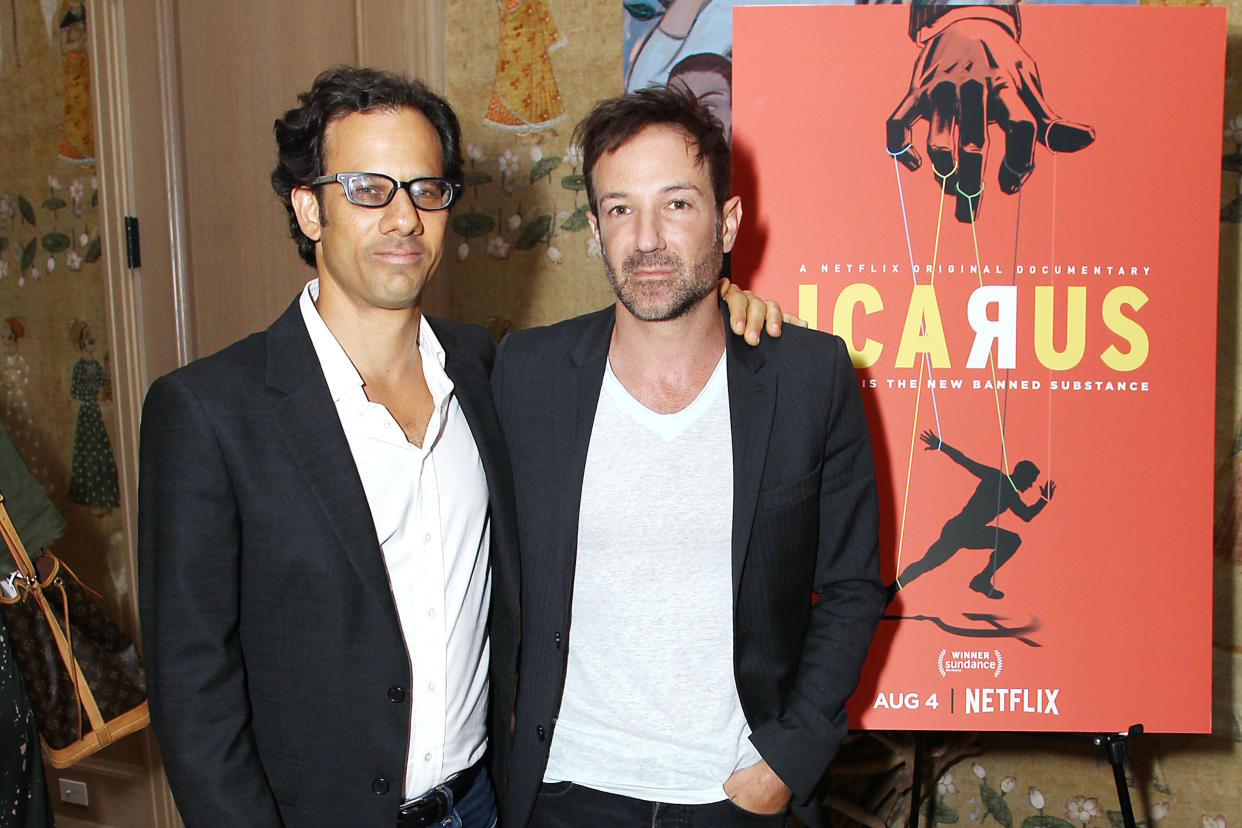‘Icarus’ Team Bryan Fogel & Dan Cogan On Exposing Russian Olympic Doping Scandal And Making Oscar Doc Shortlist

For sheer newsworthiness, Bryan Fogel’s documentary Icarus must qualify as perhaps the most impactful documentary of the year.
The film played a key role in exposing the vast athletics doping program orchestrated by the Russian government, which recently prompted the International Olympic Committee to ban Russia from the upcoming Winter Games in South Korea.
“Icarus was one [piece] of the evidence that the [IOC] used in making that decision and we’re very pleased about that,” Fogel tells Deadline. “That was a proud moment as filmmakers, to be recognized in that capacity by the Olympic organization.”
It’s an improbable outcome for Fogel’s documentary because his initial goal with Icarus was a bit more modest. As an amateur cyclist himself, the director aimed to show how easily anti-doping measures could be circumvented, as had happened in the case of seven-time Tour de France winner Lance Armstrong.
“Here was a guy who to this day has never actually been caught for doping. He has passed 500 anti-doping controls clean,” Fogel explains. “The only way he was actually caught was through criminal investigation where his teammates—who did the same thing as he did—ratted him out in exchange for their own immunity. And that ultimately forced his confession.”
While exploring flaws in how doping tests were conducted Fogel came into contact with Dr. Grigory Rodchenkov, a Russian chemist who ran his country’s accredited anti-doping lab.
“It oversaw the testing for all Russian athletes across all sports. He also oversaw the testing at the Sochi Olympics that were held in Russia in 2014,” Fogel states. “He was one of the most powerful scientists in the anti-doping world. But as it turns out he was really in the anti-anti-doping world.”
Rodchenkov wound up revealing to Fogel that he had guided Russian athletes on how to avoid testing positive for banned substances. And Rodchenkov insisted the Russian government had ordered him to implement a system that would allow its athletes to dope throughout the Sochi Games and to conceal that fact through elaborate means. The scheme involved tampering with what were thought to be tamper-proof urine collection bottles.
“Russia figured out how to open up these bottles undetected. They could essentially dump out the dirty steroid urine of the Russian athletes and swap it in with the clean urine of that same athlete that they had collected eight months, nine months, a year prior to competition,” Fogel reveals. “They went from trying to evade detection to just a flat out fraud.”
The director adds, “The mandate from [Russian President Vladimir] Putin, according to Grigory, was to win at all costs—meaning whatever you’ve got to do, win.”
After Rodchenkov blew the whistle on the operation, Fogel says the scientist became a marked man in Russia. He and producer Dan Cogan assisted Rodchenkov in getting to the U.S.
“I helped him get a plane ticket…And he somehow gets out of Russia,” Fogel recalls. “He’s got this hard drive with him that contains basically 1,700 documents of evidence, spreadsheets with metadata that links back to the Ministry [of Sport] of where the emails were sent, the details of what [banned substances] every athlete was taking, when they were taking it, their bottle collection numbers and ultimately photographs and schematics of what they had done at the Sochi Olympics…And then we brought it to The New York Times [in 2016] and they corroborated the story and ran with it.”
Rodchenkov remains in the U.S., “in protective custody of U.S. law enforcement,” as Cogan put it. Back in September, a Moscow court issued a warrant for his arrest on charges of “abuse of authority.”
Russia has blamed Rodchenkov himself for failures in its anti-doping procedures, and vigorously denied any state involvement in the subterfuge. In light of that continued denial, Cogan believes the IOC should take sterner action against Russia.
“I don’t see how you can let Russia back into the Olympic family until it admits that everything that Grigory said is true and that in fact there was a state-sponsored doping system that set out to scam the Olympics and the rest of the world,” the Icarus producer insists. “If the IOC doesn’t force Russia to do that, what good is any of this? It’s a small penalty [to ban Russia] for one Olympics but it shows the Russians that they can go on and just keep doing it. So I think there needs to be more.”
Icarus is currently streaming on Netflix, which acquired the film at the Sundance Film Festival last January, reportedly paying $5 million for it. The film recently made the Oscar documentary shortlist, and with the Winter Olympics approaching, Icarus is sure to remain in the news.
“I’m really proud,” Cogan tells Deadline of making the Academy shorlist. “It’s a really exciting year because there’s not one clear Goliath in the race in the way there has been in the past—nothing that’s the equivalent of Amy or [O.J.: Made in America]. And I think that’s fantastic. Most of all I’m thrilled for Grigory because I think all of the attention that comes to the film will be important in keeping the public’s eye on him and his story, which is going to be important for him to be safe.”
Related stories
Deadline's Top 10 New TV Shows Of 2017, Part 1: Marvel, Adaptations & Late-Night
'Mindhunter' Celebrates Christmas Eve With Ed Kemper At The California Medical Facility
'Bright' Review: Netflix's Misguided Mashup Of Cop And Fantasy Genres Does No Favors For Will Smith
Get more from Deadline.com: Follow us on Twitter, Facebook, Newsletter

